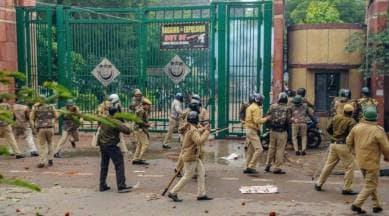Stay updated with the latest - Click here to follow us on Instagram
Judge hearing Jamia violence cases recuses himself citing personal reasons
Moves comes on a day the Delhi Police moved plea in High Court challenging ASJ Varma’s order discharging Sharjeel Imam and others

The Delhi court judge who six days ago discharged JNU student Sharjeel Imam and 10 others in connection with violence near Jamia Millia Islamia in 2019 has recused himself from hearing other cases related to the incident.
On February 4, Additional Sessions Judge Arul Varma of the Saket district court discharged Imam, student activists Asif Iqbal Tanha and Safoora Zargar, and eight others. The judge had observed that the police did not apprehend the “actual perpetrators” but “managed to rope” the accused persons as “scapegoats”.
monthly limit of free stories.
with an Express account.
On Friday, the Delhi Police moved a plea in the High Court challenging ASJ Varma’s order. Police said the trial court had been “swayed by emotional and sentimental feelings” and had “passed gravely prejudicial and adverse remarks against the prosecuting agency and the investigation”.
ASJ Varma’s court has been hearing two cases connected to the violence that took place near Jamia Millia Islamia on December 13 and December 15, 2019.
In his courtroom on Friday morning, as the hearing began in the December 15 case, ASJ Varma told the lawyers for the accused that “due to personal reasons”, he “hereby recuses himself from the matter”. The matter has now been sent to the Principal District and Sessions Judge at Saket district court, with a request to transfer the matter. The application will now be heard on February 13.
Advocate Deeksha Dwivedi, who represents one of the accused in this case, told The Indian Express, “When we were present at the hearing, the judge said I am recusing myself from the matter. I told the judge that this is very saddening. The judge told us that you need to have faith in the law and judiciary and that you need to trust the system.”
Discharging the accused in the December 13, 2019, Jamia violence case, ASJ Varma’s order had stated that “dissent is nothing but an extension of the invaluable fundamental right to freedom of speech and expression contained in Article 19 of the Constitution of India, subject to the restrictions contained. It is therefore a right which we are sworn to uphold”. He had also quoted Mahatma Gandhi and Chief Justice of India DY Chandrachud to state that “dissent has to be encouraged, not stifled”.